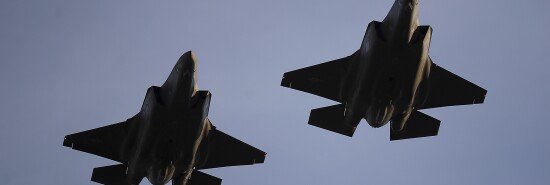
Pentagon must reject absurd F-35 performance-based logistics contract
Tom Rogan
Video Embed
It is ludicrous that Lockheed Martin is pushing the Pentagon, as DefenseNews reports on Tuesday, for a contract that would allow it to reduce its F-35 fighter jet spare parts stockpile.
Such a contract would add to Lockheed’s profits and might also save the government money. In the event of war with China, however, a shortage of F-35 spare parts would be disastrous. That matters because most U.S. military analysts believe such a conflict over Taiwan is more likely than not by 2030. This is only the latest problem with the F-35. The jet has long been defined by malfunctions and soaring cost overruns.
FORTUNATELY FOR CHINA, CONGRESS REMAINS BEHOLDEN TO THE LITTORAL COMBAT SHIP
In 2023, the F-35 is very well suited to a conflict with Russia. Unfortunately, the jet is poorly suited to a conflict with China. (Lockheed’s F-22 would likely flourish in that conflict, but former Defense Secretary Bob Gates canceled the F-22 program, so too few jets remain in service.) The central China problem for the F-35 is that, in war, the Taiwan Strait area will be saturated by a wide range of People’s Liberation Army ground, air, naval, and space-based electronic warfare, radar, and other sensor-sensor denial systems. These systems would almost certainly mitigate the F-35’s keystone capabilities. U.S. F-35s have already interacted with the PLA, with a top U.S. general “impressed” by the latter’s performance.
Some disregard these concerns. The Heritage Foundation’s analysis and Lockheed’s paid writers argue that only the F-35 has the stealth to survive against the PLA and the sensors to support other U.S. forces effectively. But their sensor thesis depends on the F-35s data networks not being jammed, a dangerous hedge. More importantly, they fail to account for the F-35’s limited range (exacerbated by the denial threat PLA anti-ship ballistic missiles will pose to U.S. aircraft carriers) and munitions payload. They also underplay the F-35’s high operating costs over expected lifespans versus other jets such as the F-15EX. The F-15EX is better suited to the Taiwan fight.
Still, the F-35 is in service and would inevitably play a key role in any Taiwan war. In turn, the Pentagon must maximize the readiness of its F-35 forces to sustain the fight in a wartime environment facing numerically and sortie-generation superior enemy forces. That brings us back to the spare parts concern.
DefenseNews’s report centers on Lockheed-Pentagon negotiations to establish what’s known as a performance-based logistics contract, or PBL, for future F-35 servicing needs. DefenseNews notes that the F-35’s current readiness levels are well below military targets. It also notes the lament from a top U.S. Air Force officer earlier this year that Lockheed has adopted a “just a time” approach to spare parts. What does this mean for a prospective China war?
Audrey Brady, Lockheed’s executive for the F-35, tells DefenseNews that the PBL deal would cater for a 10% month-on-month surge in flight hours. But Brady adds that “the current construct [of the PBL draft] doesn’t have a war-level surge; it has a month-to-month flight hour surge.” Instead, the Pentagon and Lockheed want to “wargame” those war-level expectations. This is Washington-speak for “put those expectations off for another day somewhere over the rainbow.”
The Pentagon appears equally unserious about the China war concern. When it comes to the Pentagon’s JPO F-35 office, DefenseNews notes that “the JPO explained the office could not address broader discussions at the Defense Department level in regard to requirements for a sustained surge environment.” Washington translation: “Stop asking difficult questions about requirements during war.”
This is ridiculous. The war in Ukraine has underlined the profound fragility of U.S. munition supply chains. To risk an even greater spare parts shortage in advance of a major war with China is insane. The Pentagon should reject this gambit in turn. And if it won’t do so, Congress should step in to do the Pentagon’s job for it.
The Pentagon’s job, after all, is to maximize the military’s readiness to fight and win the nation’s wars, not to keep Lockheed happy and save short-term funds.
